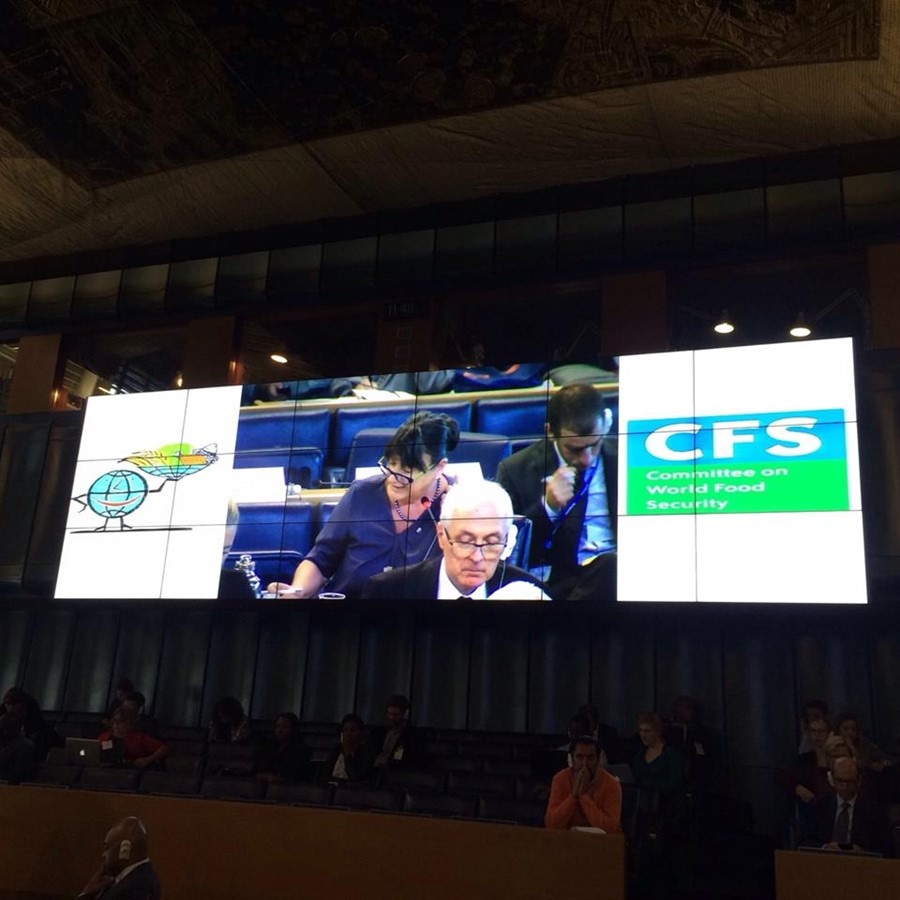
Day three at the CFS-41 gave us, among other issues, a discussion on priorities, also known as the Multi-Year Program of Work and Priorities (MYPOW) for the upcoming CFS biennium (2016–2017) – an area that civil society members have had their sights set on for some time.
With the end of this week’s negotiations approaching, the focus will soon turn towards the new activities in 2016–2017. As declared by the CFS on 15th October, the thematic area selected for 2017 is forestry, whilst the subject of the 2016 CFS High-Level Panel of Experts (HLPE) report will be “Sustainable agricultural development for food security and nutrition, including the role of livestock.”
The decision comes as welcome news for civil society organisations, who believe that the latter topic can allow scope for agroecology to shine in all its glory. As things stand, agroecology is still widely misunderstood and undervalued by policy makers, and needs to be given a firm leg up in food and agricultural policy negotiations. As highlighted in CIDSE’s recent paper and the preceding 2012 CIDSE paper focused on climate and agriculture, agroecology is a whole-systems approach that sustains yields and optimises the use of local resources while minimising the harmful environmental and socio-economic impacts witnessed with intensive practices. As captured neatly in a 2014 report from IIED, there is now a healthy body of evidence-based literature underscoring the multiple benefits of agroecology for people and planet alike, yet many decision makers are either yet to be persuaded, in part due to misinformation or lack of reliable sources, and in part – we fear – due to the omnipresent and ever-powerful influence of corporations, increasingly ready and waiting to wave their magical industrialised and profit-driven wand in the name of ‘development.’
What’s needed to turn this dangerous scenario on its head is a paradigm shift. The current mainstream narrative – with its green economy, its GMOs, its fertilizers, and a whole other myriad of ‘solutions’ geared at pulling the world’s poorest back from the brink of hunger – is a patchwork quilt that has become tired and threadbare, and which now needs unravelling and re-stitching. Only by weaving diversified, democratic and sustainable food systems into the fabric of our society can we hope to surmount the formidable food crisis facing millions around the world.
By the same token, great care is needed to ensure that corporations and other like-minded stakeholders – often harnessing strength in numbers through their engagement in international ‘alliances’ which are becoming increasingly commonplace in development spheres – do not begin to spin their own yarn in this area, embracing our language and demands on the surface, whilst quietly acting in business-as-usual, profits-before-people mode behind the scenes. Keeping track of such developments will require strict vigilance from civil society. It will also call for a commitment from governments to implement adequate monitoring and accountability tools, and to show political will in favour of holistic, agroecological systems which can bring real and lasting solutions in the face of poverty and hunger. In this context, a stitch in time could save nine… and lives. Which governments will be courageous enough to take the first step?
